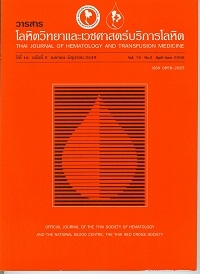ความถี่ของยีนไซโตโครม P450 2C9 ในคนไทย
คำสำคัญ:
Warfarin, Cytochrome P450 2C9บทคัดย่อ
บทคัดย่อ
ผู้ป่วย ที่ ได้รับ ยา วาร์ฟาริน เพื่อ การ รักษา และ ป้องกัน ภาวะ ลิ่ม เลือด อุด ตัน มี โอกาส เกิด ข้อ แทรก ซ้อน จาก ยา
วาร์ฟาริน เนื่อง จาก ไม่ สามารถ คาดคะเน การ ตอบ สนอง ต่อ ยา ใน ผู้ป่วย ได้ ล่วง หน้า ยีน ไซ โต โครม P450 (CYP) 2C9
ซึ่ง เกี่ยวข้อง กับ การ ออก ฤทธิ์ ของ ยา วาร์ฟาริน อาจ เพิ่ม ฤทธิ์ ต้าน การ แข็ง ตัว ของ เลือด ทำให้ เกิด ข้อ แทรก ซ้อน ได้ คณะ ผู้
วิจัย จึง ได้ ศึกษา ความ ถี่ ของ ยีน CYP 2C9 ใน ผู้ บริจาค เลือด จำนวน 326 ราย และ ใน ผู้ป่วย ที่ ได้รับ ยา วาร์ฟาริน จำนวน
67 ราย ผล การ ศึกษา พบ ว่า ความ ถี่ ของ ยีน CYP 2C9 ชนิด *1/*1 ซึ่ง เป็น wild type เท่ากับ ร้อยละ 91.4 ใน ผู้ บริจาค
เลือด และ ร้อยละ 91.1 ใน ผู้ป่วย และ ชนิด *1/*3 เท่ากับ ร้อยละ 8.6 ใน ผู้ บริจาค เลือด และ ร้อยละ 8.9 ใน ผู้ป่วย ซึ่ง ไม่
มี ความ แตก ต่าง ระหว่าง เพศ หญิง และ เพศ ชาย ส่วน ค่า mean± SD ของ ปริมาณ ยา วาร์ฟาริน ที่ ผู้ป่วย ที่ มี ระดับ prothrombin
time (INR เท่ากับ 2.0-3.0) เท่ากับ 27.8± 12.7มก./ สัปดาห์ และ ผู้ป่วย ที่ มี ยีน ไซ โต โครม ชนิด *1/*3 ใช้ ยา
วาร์ฟาริน 20.1± 5.9มก./ สัปดาห์ ซึ่ง ต่ำ กว่า ผู้ป่วย ที่ มี ยีน ไซ โต โครม ชนิด *1/*1 (28.7±13.0มก./ สัปดาห์) แต่ ไม่ มี ความ
แตก ต่าง อย่าง มี นัย สำคัญ ทาง สถิติ (p = 0.081) นอก จาก นี้ ผู้ป่วย ที่ มี อายุ มาก กว่า 60 ปี มี ความ ต้องการ ใช้ ยา วาร์ฟาริน
ต่ำ กว่า ผู้ป่วย ที่ มี อายุ น้อย กว่า 60 ปี



